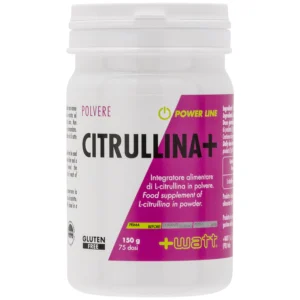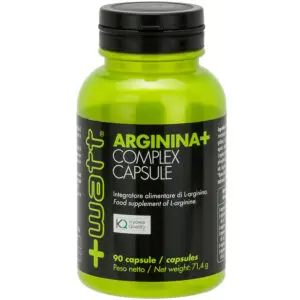L-citrulline
L-citrulline is an amino acid. Its name derives from citrullus, or “watermelon”, the fruit from which it was first isolated, in 1914. It is a non-essential amino acid, therefore, it is naturally present in our body. L-citrulline is not used for the production of proteins, but it can bring other benefits for athletic performance and for health in general. Let’s reveal some of them.
- Participates in detoxification processes
Like other amino acids (e.g. glutamine, arginine), citrulline plays an important role in the urea cycle, a set of reactions that take place in the liver and kidneys that helps rid the body of waste compounds. In particular, the urea cycle removes the ammonia that is naturally formed in the body.
- Can promote the transport of nutrients in the blood
L-citrulline is an important amino acid for the synthesis of nitric oxide (NO) – a vasodilator gas that is produced in the human body. Increased production of nitric oxide means dilatation of the vessels and increased blood flow. This may consequently improve the transport of nutrients and oxygen to the cells of the whole body, therefore also to the muscles.
This mechanism occurs when citrulline arrives in the body and gets converted into another amino acid – arginine. Arginine, in turn, gets converted into nitric oxide which causes vasodilatation.
The wider blood vessels promote the transport of nutrients and oxygen to the muscles that work during exercise, thus improving athletic performance (Figueroa et al., Curr Opin Clin Nutr Metab Care, 2017).
- Can improve athletic performance and reduce muscle soreness
Studies have shown that l-citrulline supplementation can improve athletic performance.
In one study, 22 athletes were given 2.4 g of L-citrulline or placebo for 8 days. To compare the performance between these two groups, all the participants underwent a 4-km cycling time trial.
L-citrulline supplementation significantly reduced exercise completion times (1.5%, p <0.05 compared to placebo). In addition, L-citrulline significantly attenuated the subjective perception of muscle fatigue immediately after exercise (Suzuki et al., JISSN, 2016).
L-citrulline or arginine?
Earlier we saw that l-citrulline is the precursor of arginine. And the human body uses arginine to produce nitric acid. So, is it better to take arginine? The answer is not that simple.
To begin with the production of nitric oxide, arginine must pass many ‘barriers’ in the body. Overcoming each barrier means ‘losing’ a part of the arginine and therefore not bringing the most of the benefits that this amino acid may bring.
Differently, L-citrulline is not recognized by enzymes that inactivate arginine (arginase) or by intestinal microbiota that metabolizes it. Absorption is, therefore, more effective.
Some scientific studies confirm that taking l-citrulline will lead to higher arginine levels than taking arginine. What is more, l-citrulline is converted very quickly to arginine when needed and is also absorbed better than arginine.
In addition, arginine and l-citrulline taken together have a synergistic action. A study performed on animals suggests that taken together these amino acids cause a faster increase in the levels of arginine in the body and therefore a lead to a marked improvement in the bioavailability of NO, compared to the same dosage of amino acids taken separately (Masahico et al., Biochem Bioph Res Co, 2014).
+Watt Advice
The bottom line: l-citrulline through the production of nitric oxide activates the vasodilatation process which favors the passage of nutrients between the muscles and the blood, thus improving athletic performance and reducing muscle soreness. Scientific studies suggest that taking together l-arginine and l-citrulline allows to increase the bioavailability of l-arginine and therefore the production of nitric oxide.




